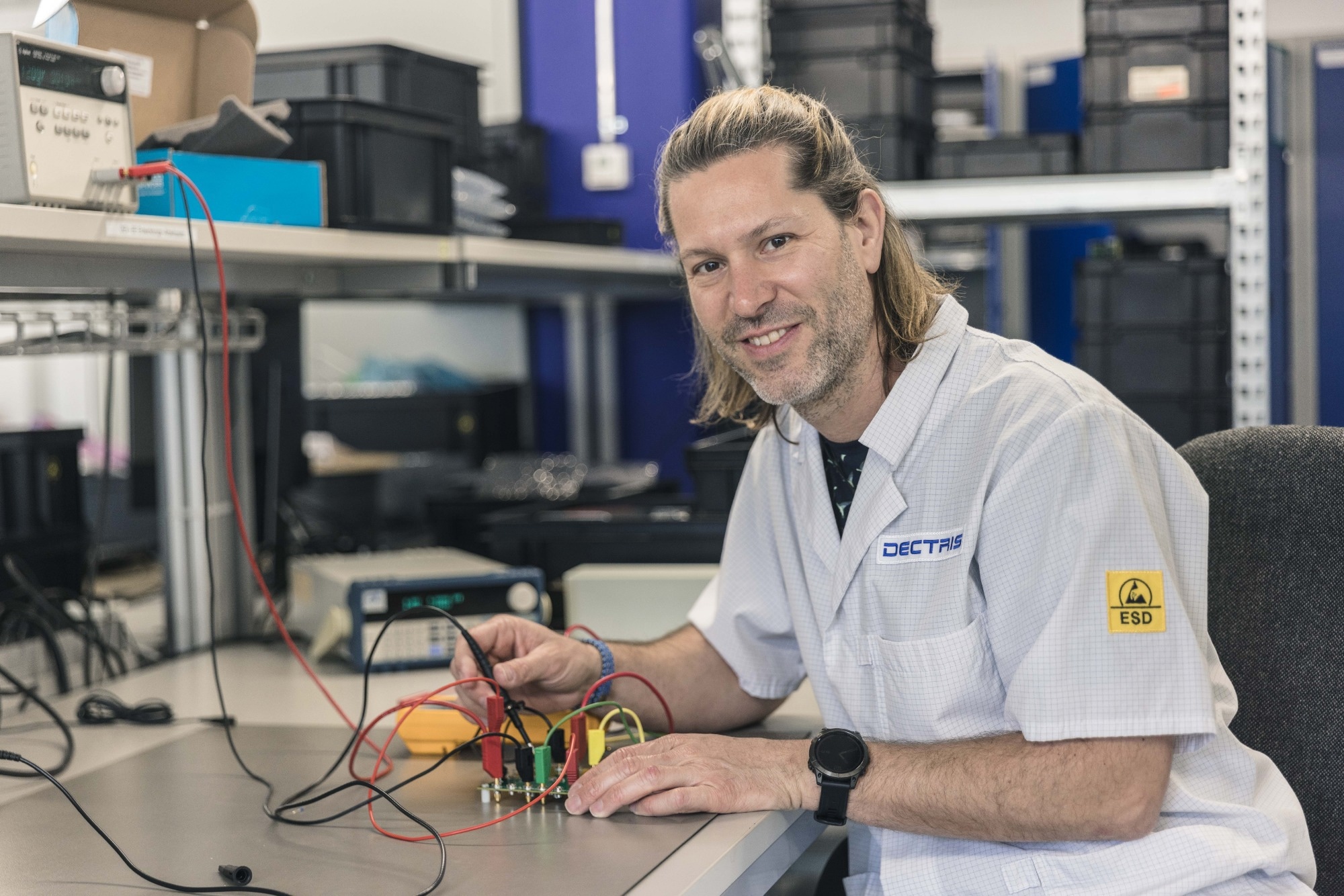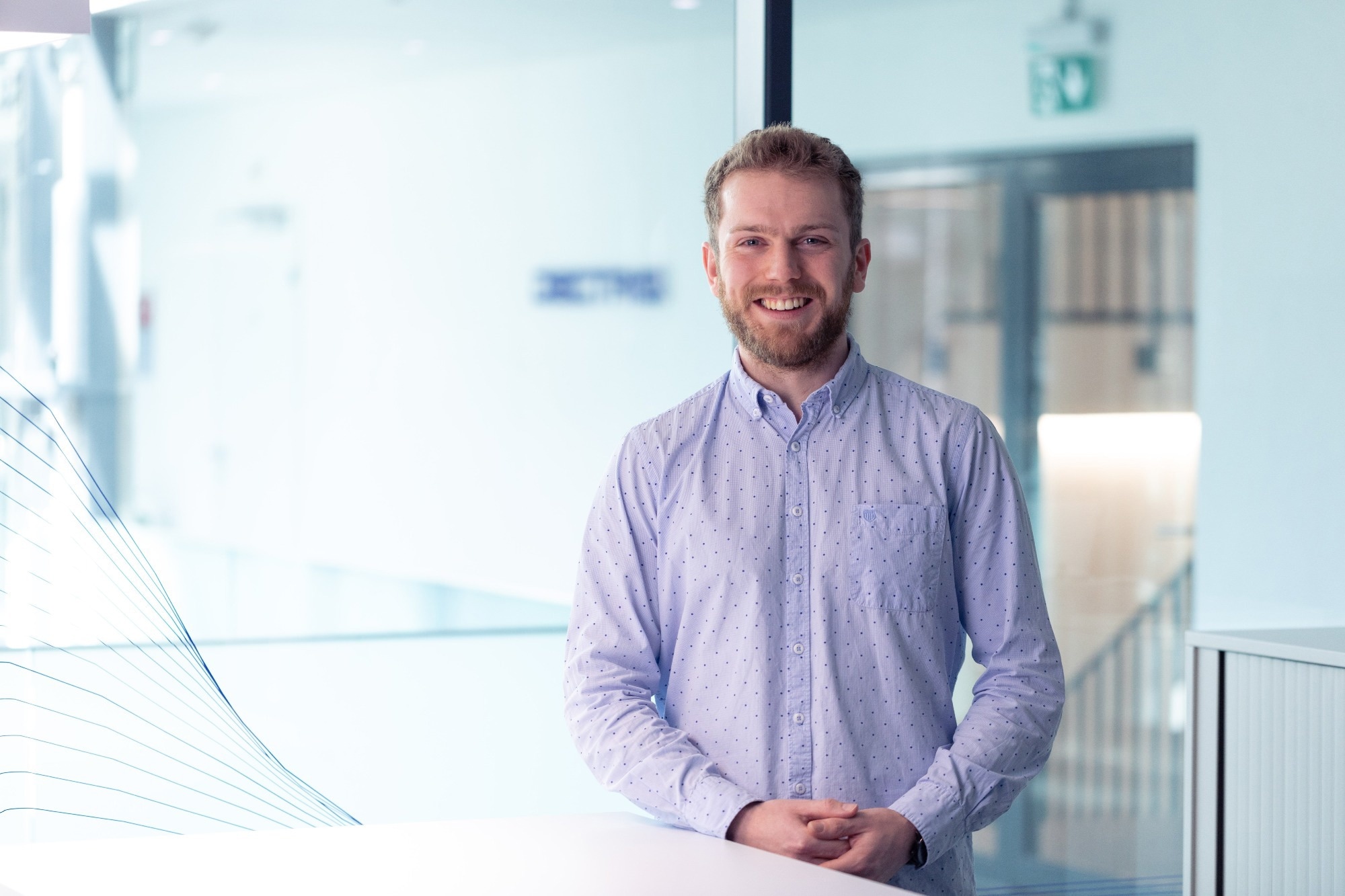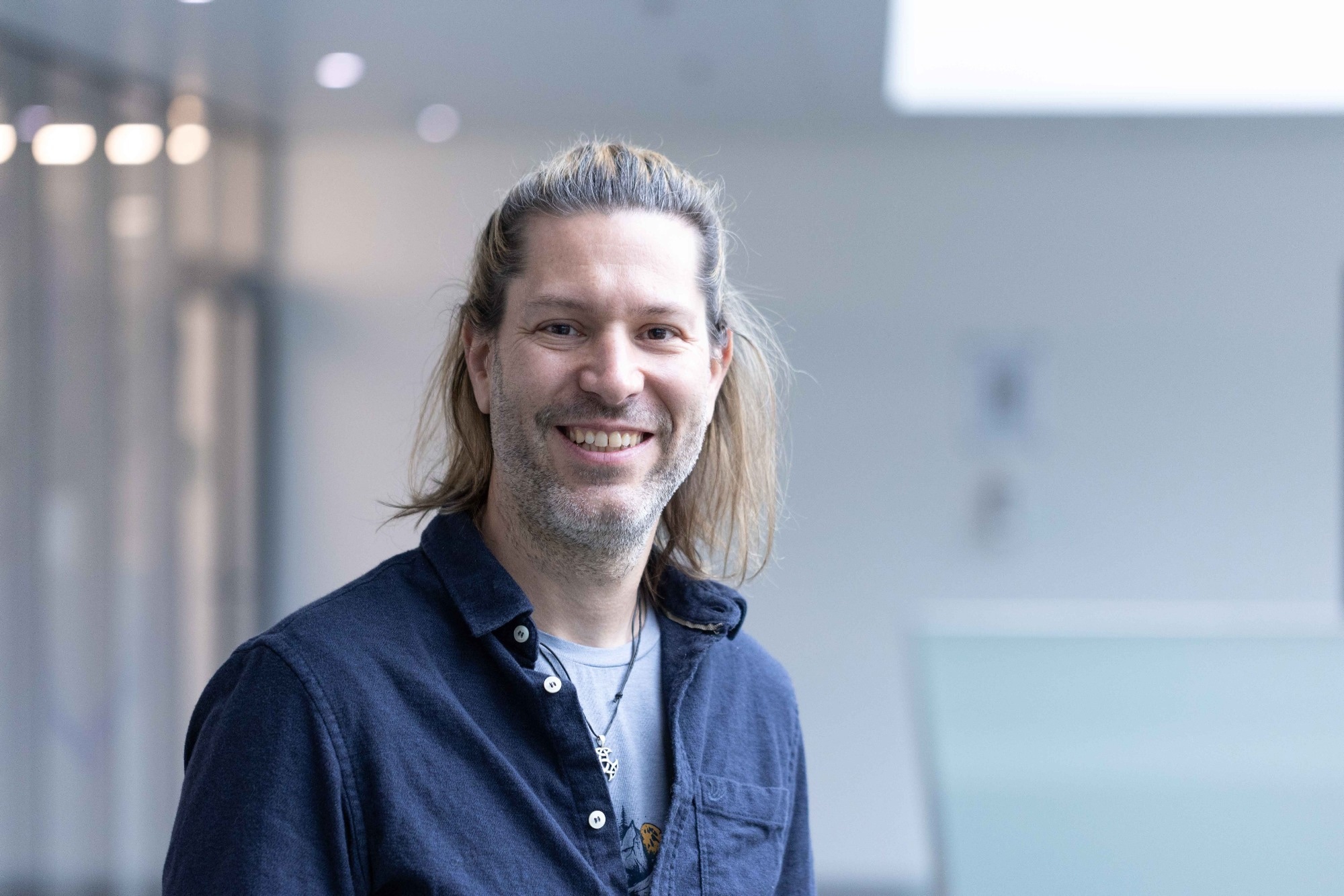Today at DECTRIS, we celebrate UNESCO’s fifth World Engineering Day for Sustainable Development. We highlight the critical roles of our engineers in building high-performing detectors to advance science and progress toward a sustainable future.

Rolf Bachmann working. Image Credit: Dectris Ltd.
At DECTRIS, we have more than ten Engineering specializations across the whole product life cycle. Over 50 highly specialized and skilled engineers are actively involved in the process. They develop software, electronic circuits, and mechanical and IT solutions; they bring in expertise during production; and, finally, they commission our detectors in research facilities worldwide. These engineers and roles correspond to more than a third of our total employees.
As a Swiss high-tech company manufacturing X-ray and electron detectors for synchrotron radiation facilities and laboratories, we have included sustainable development in our vision. We strive to be a sustainable, independent, and trusting company that anticipates the needs of scientists and engineers around the world.
The Voices of Our Engineers
Hear the voices of our engineers, working in Operations, Development, and Marketing & Sales.
Simon Zimmer, Process Engineer
“Curiosity, Innovation, and a Sustainable Future”
Simon Zimmer, a Process Engineer and member of the Compliance and Sustainability Team, explains his passion for his job: "My journey into Engineering was fueled by a curiosity to understand how things work. I am driven by a commitment to using that knowledge to engineer a thriving and sustainable future. Together, let's engineer a sustainable tomorrow".

Simon Zimmer. Image Credit: Dectris Ltd.
Pavel Novak, Facility and Equipment Engineer
“I see a future in which we will have to rely on simpler, less complex systems”
Pavel is responsible for performing maintenance and building automation at DECTRIS; this includes installation of special machines such as X-ray boxes. He also monitors our energy consumption and, last year, provided data for a tool to monitor our environmental impact better. This is how he describes his work:
“I decided to study Engineering because I had already completed an apprenticeship in handcraft and enjoyed technical solutions. I was driven by the desire for further education and my fascination for technology. My strong systemic thinking and desire for personal development also motivated me to learn more about technology and develop innovative solutions.
“Today, as an engineer, I work to deepen my understanding of objects, situations, and functions in order to optimize building automation and create clarity in the area of facility management. I ensure stable installations and environments to carry out detector tests, identify potential savings through energy monitoring in the building, and organize and plan the replacement and maintenance of installations.
“In my opinion, the complexity of a system lies more in its characteristics, while its ‘complicatedness’ is related to the understanding of objects or situations. Given the shortage of suitable specialists, I see a future in which we will have to rely on simpler, less complex systems. That is why I strive to work on sustainable and simple solutions, in which various components interact with each other and the consequences of these interactions are easily predictable”.
Rolf Bachmann, Electrical Engineer, Hardware Design
“A Better World with Better Products”
Rolf explains the sustainable visions behind his job: “Electrical engineers design the best possible circuits and source code that fit the specific application of their detectors, in order to enable the hardware in the detectors to guarantee best-in-class performance. In turn, this will allow scientists to obtain the best possible results”.
For Rolf, “[b]eing an engineer is not a title, but an inner attitude. I learn about myself and the world every day, and I use this knowledge and skill to make the world a better place and improve myself. My contribution to a better world is better products that move us forward as humanity”.

Rolf Bachmann. Image Credit: Dectris Ltd.
Francesco Marafatto, Field System Engineer
“Ensuring the Long Life of Products”
“As an engineer at DECTRIS, I ensure that the end user’s experimental downtime is minimized as much as possible, and that customers can get the most out of our detectors,” explains Francesco Marafatto, Field System Engineer and member of the DECTRIS Compliance and Sustainability team.
In his role, Francesco travels to research facilities - synchrotron light sources and laboratories - to commission and repair our detectors, as well as to support scientists on site. “I believe that what I can do to give a more sustainable future to our planet, as a Field System Engineer at DECTRIS, is to ensure that our products are repairable as much as possible. Personally, I strongly advocate for the ‘right to repair’ in general, because this strongly reduces the need for mineral resources to produce new products”.
Marlies Reher, Field System Engineer
“Extend the lifetime of detectors, minimize the use of mineral resources”
Marlies, who joined DECTRIS two months ago in the same Engineering specialty as Francesco, reflects on her role and impact on society: "The UNESCO World Engineering Day for Sustainable Development is a good opportunity for us engineers to remind ourselves to use our technical competence not only for the profit of the company, but also to promote sustainable development inside and outside of DECTRIS”.
She highlights the importance of saving the resources of our planet through informed and expert engineering: “For example, it lies in the hands of DECTRIS engineers to design and build long-lasting detectors to minimize the use of mineral resources. As an engineer in the Support Team, I repair detectors to extend their lifetime. Even after a detector type is no longer produced, and it has officially reached the end of guaranteed support, we do our best to continue providing support to the users of these old detectors. Apart from saving natural resources, this support helps to promote inclusion in research, since customers from institutions with little funding can continue doing research with their detector".
Engineering at DECTRIS: Over Ten Specializations Across the Product Life Cycle
At DECTRIS, we have twelve Engineering specializations, in which almost a third of our employees work.
-
In Research & Development, electrical engineers, mechanical engineers, software engineers, and ICT System engineers work, respectively, on the following: electronic circuits and Application-Specific Integrated Circuits (ASICs); the mechanical assembly and housing; developing the software and IT infrastructure required for running our detector systems; maintaining the entire IT infrastructure.
-
In Operations, the production engineers and process engineers develop, maintain, and optimize all processes and machines that are necessary for reliably manufacturing our detectors. Our two integration engineers are positioned between Development and Operations; they oversee the product's integration, from sales to delivery. Our equipment engineers are responsible for providing media and equipment for production, as well as for the building of infrastructure.
-
In Marketing & Sales, our field system engineers are specialists in commissioning detectors in research facilities, synchrotron radiation facilities, or laboratories. They support customers with repairs and troubleshooting. Product engineers take care of the product families throughout the entire life cycle, initiate efficiency- and operation-saving adjustments, and implement product changes.